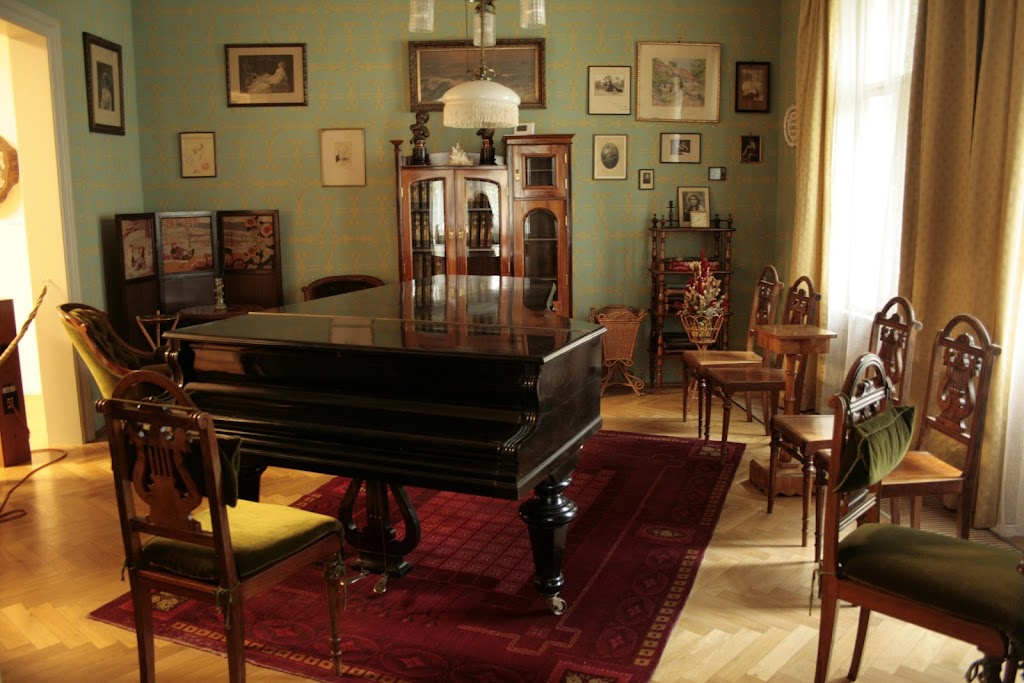
5. 11. 2022, 11 a.m.
Matinée by the Janáček Academy of Music and Performing Arts in Leoš Janáček Memorial
Ekaterina Krovateva, Vilém Cupák – singing
Nikita Ruzhavinskiy – violoncello
Marta Vašková, Magdaléna Hrudová – piano
The performance lasts 60 minutes without intermission.
Alexander Glazunov: Selection of Songs and Romances
Alexander Glazunov: Elegy, op. 17
Leoš Janáček: Selection of Songs (Moravian Folk Poetry in songs, Hukvaldy Songs)
Leoš Janáček: Fairy Tale for Cello and Piano
Alexander Glazunov was one of the most respected Russian composers of his time. He was also an acknowledged conductor and a long-time director of the St. Petersburg Conservatory. Although he died in 1936, he never abandoned the musical language of late Romanticism. He was known mainly as a composer of symphonic works, but he also left behind a respectable body of chamber works and songs.
The inspiration for Janáček´s Fairy Tale for Cello and Piano was Vasily Andreevich Zhukovsky´s “The Tale of Tsar Berendey, his son Ivan Tsarevich, the cunningness of Koshchei the Immortal and the wisdom of Marya Tsarevna, Koshchei´s daughter”. It was not the first or last time that Janáček would turn to Russia for a topic. Janáček finished his first version of the story of the Tsar´s ill-considered promise that ended up with him losing his only child on 10th February 1910. The manuscript contains three movements. Fairy Tale was performed on 13th March 1910 as part of the 6th sonata lesson at the Brno organ school. Subsequently, Janáček adapted the composition into four parts and had it performed in this new configuration on 12th March 1912. A third version was printed in 1923. The nature of the composition suggests that Janáček created it during the years when he felt a certain hopelessness and loneliness.
Moravian Folk Poetry in Songs is one of the most extensive cycles by Leoš Janáček (1854-1928), being made up of 53 songs. The composer worked on it between 1892-1901, so within a period that’s also connected with his work on the opera Jenůfa. Janáček was intensively engaged in folk music and song collection from approximately 1888, and the peak of this activity dates back to the 1890s, when this interest was closely connected to his compositional work. He remained faithful to folk songs throughout his life, however. He also devoted many years to adapting folk songs to be sung with a piano accompaniment. He experimented with them to some extent, and as a result these songs form a very distinctive part of the composer´s oeuvre. In 1892, the Šolc publishing house released the second edition of the Bouquet of National Moravian Songs, which was compiled by František Bartoš and Lev Janáček. On that occasion the publisher asked Janáček to add piano accompaniments to the songs. Janáček did so for fifteen songs which Šolc published in a first book in 1893. The second book was published in 1902, when the publisher printed the remaining 38 songs. They weren’t released together as a set until 1908, when they were published under the name Moravian Folk Poetry in Songs. The songs were performed for the first time (and only four of them) in Brno in 1904. The cycle was probably not performed completely during the composer´s life.
Jiří Zahrádka
Tips from the festival programme:
25 % DISCOUNT WITH THE PURCHASE OF 3 OR MORE PERFORMANCES, 30 % DISCOUNT WITH THE PURCHASE OF 5 OR MORE PERFORMANCES.














